#compounds sweden
Explore tagged Tumblr posts
Text



Are you kidding me? This is like a little town with not one, but 2, castles in Vinninge, Sweden. Look at all the buildings! If you love horses, it's called "a trotting facility," and it's listed for 40,000,000 SEK / $3.6M. It's all for horses- has 40 stalls, 2 tracks, and comes with walking machines, so you don't even have to exercise them yourself.


This is a SERIOUS banquet hall.

Not that old, especially as homes go, b/c it was built in 1995.

Banquet hall anteroom.

Your trophy room to display your horses' triumphs. So cool.

Looks like a fairly new kitchen in here.

But, it's not just about horses- this building is a cat hotel! Plus, it looks like those runs could also be for dogs.

Living room inside the main residence has an unusual fireplace wall with a cone-shaped fireplace.

Nice everyday blue dining room.

After lunch, get right into the hot tub.

Look at that, a coke machine in the kitchen.

Isn't this a beautiful dining room?

Indoor pool.

This is a guest house.

Look at the beautiful gazebo.

Must be the cat hotel.

The horse stalls.

That must be a horse-walking round thing. Plus, there are mature fruit trees on the property.

You can see the fruit trees in this photo.

Is that a pool for the horses?



Amazing property.

And, this orange group of buildings is just the residence.
84 notes
·
View notes
Text
Sound and colour.










#harleydavidson#rideorride#chopperlife#plebschoppers#choppers#longfork#swedishstyle#panhead#sweden#paliwo#forevertwowheels#compound#clublife
16 notes
·
View notes
Text
This is so random, but for the longest time I thought that the whole process they went through in the beginning of S3 was Arbitration. But no, what they did was actually Compounding of Offences.
I mean, both Arbitration and Compounding are based on avoiding tenuous litigation, but Arbitration involves an impartial third party who hears both sides and a conclusion is reached. But Compounding is involved when the accused party compensates the accusing party for the offence to avoid litigation. And compounding happens for offences which affects individuals only, an offence which affects the public at large is not compoundable.
I mean, it makes sense because it is based on a concept that the less litigations there are the better, and it is legal apparently, but Compounding is still based on the fact that money or any non-monetary consideration can apparently also compensate the feeling of violation and wrongdoing that the victim faces. I mean, it also depends on the receiver of such compensation- whether they feel validated by such consideration or not. But something about the values of justice getting compromised and the perpetrator getting away with their acts is something that sits wrong with me. August should have been punished imo but it was a still a realistic way the plot moved forward, if not the most satisfactory.
#idk i was just studying law and then compounding came up and i was like 'hold up this concept sounds familiar'#idk about how laws work in Sweden but it's a universal concept#this is so random actually back to studying law lmaoooo#young royals
8 notes
·
View notes
Text
Blåhajsting

join us join us join us join us join us join us join us join us join us join us join us join us join us join us join us join us join us join us join us join us
#Blåhaj#ikea#shark#landsting#swedish#svenska#sverige#sweden#totally open to being wrong about the compound word#Blåhajsting
54K notes
·
View notes
Text
2014 Nicander: PRC, Swedish Language Policy Histories Compared
Increased communications and wider use of computerized devices such as auto-correct functions in word processing and texting may accelerate the pace of language change. Frida Hylander @fridahylander.bsky.social noted on Bluesky recently that autocorrect functions for texting on the iphone give incorrect ‘corrections’ for the use of compound words in Swedish, erroneously indicating that they…

View On WordPress
0 notes
Note
History of Lidocaine please?
Lidocaine was discovered in Sweden in the early 1940s.
About 1/3 of the surgeries at the time, including hernia repair and goiter, were done under local or regional anesthesia. The drug of choice for this was procaine. And frankly, procaine kind of sucked.
It was stored as a powder and needed to be mixed with saline and epinephrine very carefully in order to be useful. It degraded quickly in this mixture and was only effective for about 17 minutes once injected. It was also toxic at repeated or high doses. So surgeons had to be fairly quick about their surgeries.
And the room was there for a longer-acting, less toxic local anesthetic agent.
In 1943 a compound called LL30 was discovered. The lab personnel that discovered it had done a quick test on their own tongues, which anesthetized well. But it needed to be proven against procaine in both toxicity and effectiveness before a product could really be sold.
In 1944 the trials began. A man named Dr. Torsten Gordh headed up the experiments, using colleagues, patients, and students as test subjects. For the colleagues and patients, he offered the equivalent of about $16 in 2024 money to be in the study. For the students, they could choose between a copy of Gordh's thesis or a packet of American cigarettes.
Most of them chose the cigarettes.
The results were so stunningly superior to procaine that statistical analysis was never done. LL30 lasted a stunning 70 minutes compared to procaine's 17. It was also significantly less toxic, meaning more of it could be used.
LL30 would later be designated as lidocaine and sold under the brand name Xylocaine, which is still used today.
66 notes
·
View notes
Text
Word of the week rules and submissions!
What is this?
This is no longer a tournament as that takes too much time and admin. We have also already decided that многоꙮчитїй/ mnogoočitii from Old church slavonian is the best word, so no need to do that again. Instead, I will use this blog to highlight a word (or a couple of words) every week (or other time period if the queue runs out) from languages which aren't English. This will be based on reader submissions with me editing for clarity and adding a blurb about the language, much like in the tournament.
In short, tell me about your favourite words! Let's all learn something new! (My favourite phase of the tournament was definitely research/round one)
Who are you?
I'm a linguistics student and language nerd from Sweden who decided to run a tournament of non-English words because I wanted to highlight language diversity. My native language isn't English, so please be kind if my posts are worded weirdly sometimes (or my username is misspelled lol)
What makes a word good?
There are many ways that a word can be good, but here are some examples: it sounds good/feels good to say, the script looks nice, it denotes an interesting concept, it denotes a concept you like, it does something interesting grammarwise, usagewise or soundwise, it's funny, it's an interesting/fun compound, it has an interesting/fun etymology, it just has good vibes... The possibilities are endless
Rules:
No words in English, but loanwords from English are allowed with good motivation
No conlangs (I love them but the focus is on natural language)
Words from signed languages are allowed and encouraged as long as you can provide an explanatory picture or film for the sign
Words from pidgins are allowed
Words from extinct languages are allowed
Usage should be widespread within a language community (if it isn't/wasn't used in the language it doesn't belong, neither does words only your family/friend group uses, but slang words are allowed)
No words that have appeared in the tournament or previously on word of the week (search for the word on my blog, all words are tagged)
How submissions and posting work (read these before submitting):
Each person is can make two submissions at a time. Please wait until yours have been posted before you submit more
The submission form is currently open. It will remain so until I have too many unposted submissions, then open again when those have been scheduled
If you're able to, please provide an IPA transcription for your word (the International Phonetic Alphabet has a sign for each sound used in any language, which makes transcription of exact pronounciation possible)
You will need to provide a translation/explanation of the word in English since that is the language used on the blog for ease of communication and reach. If the exact translation of a word is part of what makes the word good, please provide that too
It is possible to be credited for your submission if you want to
If more than 5-6 words in the same language are submitted, all of them might not be posted until some time has passed to avoid one language dominating
I reserve the right to pick which words I want to share if I have many submissions and don't want to do all of them. I do this in my very limited spare time because I think language is fun and if it doesn't spark joy I won't do it
Submissions will be fact-checked, edited for clarity and get a short text about the language. If I find something interesting while researching I might add a note about that as well
Have fun! I can't wait to see your submissions and learn something new!
Submit your word(s) through this form
39 notes
·
View notes
Text
DRUGS COST MONEY (MARK LEWISOHN, DRUG BUDDY)
I'm late, but I'm here, and this is something I've thought about since I read Tune In the first time.
First of all, Lewisohn's definition and description of what Preludin was is wildly underplayed and misleading, so I have to just get out a few quick Preludin facts. They're helpful.
Lewisohn:
Preludin was an appetite suppressant, an anorectic drug introduced into West German society in 1954, when commercial pressures were making women become more image-conscious. Users maintained an appetite but quickly felt full when eating, and the reduced intake brought about weight loss. Preludin’s primary ingredient, phenmetrazine, was not an amphetamine but an upper, giving the user a euphoric buzz. It was soon sold internationally and used recreationally, and though available in Germany only with a doctor’s prescription...
- “Tune In” - Chapter 19; Piedels on Prellies
(Oh, those women and their obsession with weight.)
I know Lewisohn's not a chemist and I don't expect him to have done extensive study before writing “not an amphetamine but an upper”—which, first of all is just a weird, grade school sounding statement about any stimulant in general that no scientist would ever say or write—but also he makes it sound like it's a fizzy little pill that gives you the sillies.
But definitely not an amphetamine or anything bad like that.
Look, even Wikipedia says right at the top, “[i]ts structure incorporates the backbone of amphetamine,” and although I didn't spend more than a few seconds there, I saw it because it came up first in the search like Wikipedia always does. Just saying it's basically impossible to miss.
And whether he was trying to hide the ball or not, since he wrote so much about them I am going to quickly set the "not amphetamine" record straight before I go on.
“Methamphetamine hydrochloride (Desoxyn) and phenmetrazine hydrochloride (Preludin) are two variants of the amphetamine structure.”
- “Amphetamine Abuse”, Sidney Cohen, MD, JAMA
“The experience in Sweden seems to indicate that phenmetrazine (e.g. Preludin) has the highest potency, and the greatest risk of psycho-toxic, acute and chronic effects (Rylander 1966). Amphetamines and methylphenidate seem to show less dependence-producing and psycho-toxic effects than phenmetrazine.”
- (United Nations Bulletin; Vol XX, No. 2)
Basically, Preludin was synthesized by taking an amphetamine skeleton and boosting tf out of it by adding a very common sort of chemical scaffolding to it called a morpholine ring, allowing them to tweak it by sticking on a nitrogen group. But morpholine rings by themselves also increase potency and usually bioavailability.
So in the narrowest technical sense, Phenmetrazine (Preludin) is classified as a morpholine instead of an amphetamine, but in every way it is an amphetamine on speed. (And every description of it anywhere says so right up front.) It was Amphetamine Plus. The little added synthetic kicker the pharmaceutical company figured out how to attach to the amphetamine made it stronger—gave it the Preludin "kick"—made the high feel better in general (according to all this crap I spent way too much time reading) and also made it way more addictive. It increased dopamine and norepinephrine reuptake, and the compound itself displayed “some entactogen properties more similar to MDMA." It made Preludin far more psychoactive than straight amphetamines. Made smells stronger, sensations more intense, and made you horny and "increased performance." It was taken off the market in 1980 because it was so hyper-addictive and the “psycho-toxicity” was so extreme. People reported doing things they barely remembered, including to a kind of freakish degree, like a lot of users committing crimes for the very first time in their lives. And so the company tried to replace it with a similar drug called Prelu-2, which is apparently still available but also almost never prescribed because even that was excessively addictive compared to non-boosted amphetamines.
And also, it made you feel body odors?
"...perfumes and flowers get a stronger smell, and body odours are felt more strongly than under normal conditions."
- (United Nations Bulletin; Vol XX, No. 2)
What are normal conditions? Maybe my normal conditions are different from everyone else's because I don't normally feel body odors?? But tbh I would literally try this drug just to see if I could.
Okay.
So... John was feeling some serious body odors because my man took a lot of them. Usually with lots of booze.
And apparently they made him more awesome.

George spoke graphically of how they would be “frothing at the mouth … we used to be up there foaming, stomping away.” John, as always, dived straight in, wholeheartedly grabbing another new experience with an open mouth and no thought of tomorrow. The Beatles called them “pep pills”—the commonly used British term of the period—and also “Prellies.”
...Two pills a night were more than enough for most but John frequently took four or five, and in conjunction with hour after hour of booze he became wired, a high-speed gabbling blur of talent, torment and hilarity.
- “Tune In” - Chapter 19; Piedels on Prellies
Yeah, he sounds like a blast. Good thing you got a quote there, my guy. I'm sure the first description that would’ve come to his roommates’ minds would be “hilarity.” Or second, after “hero.” (Sorry, I don't want to be hard on John. I have a lot of bandwidth and patience for drug indulgences, especially in a situation like this, but Lewisohn is unbelievable.)
Ruth Lallemannd, a St. Pauli barmaid who knew the Beatles from 1960, recalls an occasion when “They crushed ten Prellies to powder, put them in a bottle of Cola and shared it between them. They were always wound up.”
Drugs cost money
Amazingly enough though, these prescription-only pills didn't just magically get from people with nice doctors to John’s hands. Someone sold them to someone else and they ended up with “the toilet lady,” Tante Rosa, who sold them.
They looked like little white sweets … but these were no mint drops.
- Chapter 19
So cute!
Preludin small-print advised against its being taken less than six hours before bedtime, in case of sleep disorders.
- Chapter 19
So if Lewisohn is reading the small print of a drug that was discontinued 44 years ago he did not miss the Wikipedia page and must know that “not an amphetamine but an upper” is wildly misleading. Technically true in the chemical classification sense, but not in the medical or pharmacological sense. And true in the same way that “fentanyl isn't morphine” is true.
But that's not my point.
My point is that these “little white sweets” were strong, had wild “psycho-toxic” effects, John took a lot of them, and they weren't free.
Because drugs cost money.
Paul slept fine on just the one pill, John and George didn’t. George would recall “lying in bed, sweating from Preludin, thinking, ‘Why aren’t I sleeping?’ ” John simply took more: “You could work almost endlessly until the pill wore off, then you’d have to have another … You’d have two hours’ sleep and wake up to take a pill and get on stage, and it would go on and on and on. When you didn’t even get a day off you’d begin to go out of your mind with tiredness.”
Or, put another way, John was “a high-speed gabbling blur of talent, torment and hilarity.” And Paul did uncool stuff like sleeping.
Also, what in the...
Tony, George, Paul, John and Pete, along with Rosi and perhaps some stray females, would stagger wearily and noisily up three long flights of wooden stairs...
“Stray females”??? Is he talking about cats? Don't call human beings “strays,” you self-important oddity.
THE GROWNUP
John was never much into paying for stuff. Like rent, for instance. But that's what friends are for.
John was blessed with a particular talent for frittering away his funds (the council grant designed to provide his working materials) and was rarely in a position to pay [rent]. As Rod remembers, “During the week I’d go and have a pint with him and he’d always have money for a beer, but when it came to the day to pay the rent he was always hard up. ‘Could I owe it to you?’ ‘Would you like this jacket?’ One time he paid me with a Mounties-type Canadian jacket he’d probably nicked from someone else.”
- “Tune In” - Chapter 13; “Hi-Yo, Hi-Yo, Silver–Away!”
He paid rent with a jacket? Landlords take those?
I'm not gonna lie, the only real issue I've ever had with Paul—the things I have the most confusion and hesitancy about—are when he seems inexplicably cheap. Like paying the Wings band so little for so long. There's only a few cases that come to mind, but they're my weak point with him.
Still, having done my share of experimenting—as well as dating a guy who became a high-functioning addict before becoming a non-functioning addict before becoming an ex who died of an overdose—I know very well how it feels to see money flow through your hands like water and into someone else's bloodstream. And what happens then is you either both starve or you are the only one eating. In the end, someone has to have money to live, and the more drugs my ex took the more I was forced into being a walking, talking, pissed off safety net.
Stu supposedly got in a fight with Paul because Stu owed Paul money. (Although that doesn't explain attacking Paul out of nowhere on stage half as well as a three-days-awake-Prellie-binge psycho-toxicity does.)
It does, however, mean that at least one guy in the band who was taking Preludin was running out of money between paychecks.
And there's no way that if Stu was running out of funds that John wasn't too. And faster. And according to Lewisohn, George was eating a lot of Preludin, too. Because he was also cool.
That leaves Paul.
John was notoriously bad with money even when he had a lot, and when everyone is living and working together it's almost impossible to be the only guy eating or the only guy smoking. But at the same time if you know you can't do anything to stop your friends from going hard and never thinking at all, it tends to make you more careful. Because you're all you've got and all they've got. You didn't ask for the job, but you drew the short straw. So you hide some cigarettes and share too many, and get increasingly sick of it and resentful, but there's no good answer.
John heaped a ton of spice into the mix by suddenly moving back into Mendips. He’s unlikely to have told Mimi of the Gambier Terrace eviction, but Rod Murray knew little of this hasty departure: John left most of his possessions in the flat and several weeks’ rent unpaid—to the tune of about £15. He just scarpered.
- “Tune In” - Chapter 15; Drive and Bash
“Spice.” Dude really said “spice.” That John, so spicy. And fwiw, that's £300 today.
Maybe John had another jacket to pitch in.
Paul says he's more cautious by nature and I'm sure that's true, but also you know they all relied on him because they knew he wouldn't be as stupid as they were. Who knows what he would've done—whether he would have lived a more libertine life in Hamburg—if he'd felt like that was an option and he didn't have to be the grownup. Who knows what he would have done if anyone else gave a shit whether they ate or smoked.
I'll end by repeating the freakishly weird way Lewisohn told a John psycho-toxicity story that the AKOM ladies pointed out in Ep 8: No Greater Buddy, since it's almost impossible not to talk about John and Prellies without it.
“PAUL AND GEORGE’S HERO-WORSHIP STAYED FULLY INTACT”
George was second only to John in the swallowing of Prellies and knew better than most the sum effect of taking too many for too long, how the combination of pills plus booze plus several sleepless days caused hallucinations and extreme conduct. He’d describe one occasion when he, Paul and Pete were lying in their bunk beds, trying to sleep, only for John to barge into the room in a wild state. “One night John came in and some chick was in bed with Paul and he cut all her clothes up with a pair of scissors, and was stabbing the wardrobe. Everybody was lying in bed thinking, ‘Oh fuck, I hope he doesn’t kill me.’ [He was] a frothing mad person—he knew how to have ‘fun.’ ”
Handling John was something his friends were well used to doing. If he didn’t murder them in their beds there was no greater buddy. They might fear for their lives but they loved him still. No way would they walk out and join another group. John was just John, and Paul and George’s hero-worship stayed fully intact.
- “Tune in” - Chapter 28; You Better Move On
Mark Lewisohn knows nothing about drugs or drug culture. Which is fine. Good. Great, even. But the thing is, it doesn't stop him from knowing everything about it. He has confidently and emphatically stated that John and Yoko weren't doing heroin in the daytime during the Get Back sessions. He even claims that they weren't on heroin during the Two Junkies interview. Even repeating this paraphrase makes me feel ridiculous, but he says that was a hangover from the night before, and that they were too lucid to be high. Which, first of all, is not how heroin fucking works. They were blasted. The aftereffects would be them being antsy and jumpy, not going in extra-slow motion and puking. Blows my mind, the hubris this guy has. To confidently state something he unquestionably pulled out of his ass without even a moment's hesitation. Not only is that not how heroin works, but it is the drug that people wake up to do. Not wake up and do. Wake up to do.
And you can tell from the way he talks about John on Prellies—“a high-speed gabbling blur of talent, torment and hilarity”—that he has never experienced anyone who's been up a few days. And I still have a more daring nature than most of my friends, and am in no way shocked by the drug use. Me and my friends in Houston used to take Fastin and go midnight bowling every Saturday. The memories are good and I regret nothing. But the naive way Lewisohn romanticizes John and low key mocks Paul—as if Lewisohn was the ultimate drug buddy and Paul a total prude—is so weird. It's freakishly, embarrassingly, weird. Like he wants to be the cool guy. Like he thinks he can be the cool guy, and is being the cool guy, but to me it's painfully embarrassing and nothing else makes him look more desperate and delusional.
#beatles#akom#lewisohn#tune in#fine tuning#the beatles#john lennon#paul mccartney#historiography#Prellies#Hamburg#preludin#george harrison#Mark Lewisohn#drugs#drugs cost money#Spotify
61 notes
·
View notes
Text
KIRUNA, Sweden—The Sami people, one of Europe’s last Indigenous populations, have inhabited northern Sweden for thousands of years, maintaining a unique way of life that is intertwined with their territory and with reindeer herding. Reindeer are a cornerstone of Sami life and economic subsistence and also serve as a living connection to Sami traditions and cultural identity.
Though Sweden did not engage in overseas colonization to the same extent as other European countries, it did look to the north to extract resources. Vast reserves of minerals, wood, and water in the north of Sweden helped the country become one of the richest in the world.
These resources are mainly located on Sami land, which has increasingly come under threat from green-energy projects, including wind farms, mining expansions for rare-earth minerals, and forestry. These projects obstruct migration routes, fragment pastures, and shrink reindeer grazing lands—disrupting the ecosystem’s delicate balance and Sami activities. Forced displacement becomes a tradeoff for innovative climate-change mitigation.
The Sami have a long-standing spiritual connection with their land, making their living through reindeer herding, deer hunting, fishing, and farming. The reindeer provide the Sami with what they need to survive in a harsh environment; the herders rely on vast grazing lands and migration routes between summer and winter pastures that have passed through generations.
However, modern reindeer herders struggle to uphold their ancestral responsibility to steward the land due to extensive exploitation. Unlike neighboring Norway, Sweden never ratified the International Labour Organization’s Indigenous and Tribal Peoples Convention of 1989, which protects the rights of Indigenous and tribal peoples. In 2020, the U.N. Committee on the Elimination of Racial Discrimination concluded that Swedish law discriminates against the Sami.
Despite this, the Swedish government continues to prioritize green-energy projects on Sami land. These projects often involve state-owned companies, private contractors, and multinational corporations, reflecting a push toward energy resilience at the expense of Indigenous rights. The Sami use the term “green colonialism” to describe these hegemonic sustainable policies, connecting colonial resource exploitation with the current dispossession carried out to advance the green transition.
Wind farms, for example, reduce grazing land for traditional reindeer herding because the noise and movement of the turbines disturbs reindeer. Building up hydropower has required the construction of numerous dams and reservoirs, mostly located on Sami land, that altered natural water courses essential for traditional fishing practices and also flooded large areas, resulting in further loss of grazing land. This has displaced some Sami households toward urban centers, disrupting their way of life.
Timber plays a central role in green policies, from sustainable construction to biomass and biofuels; it can replace non-renewable materials such as steel, concrete, and aluminum. However, commercial forestry decreases biodiversity and the availability of grazing land. In Sweden, extensive logging has led to the loss of lichen, a crucial source of nutrition for reindeer.
Logging companies have also been criticized for not respecting Indigenous rights: Protesters have targeted the Swedish state-owned forestry company Sveaskog, which has been clear-cutting forests on Sami land.
Mining operations further compound the issue. Nine of the 12 mines in northern Sweden are located on Sami territory, including one of the European Union’s largest copper mines, the Aitik mine outside the town of Gallivare; and the world’s largest iron ore mine in Kiruna. The town of Kiruna is being dismantled and relocated several miles eastward amid expansion of the mine; this will displace both urban and Sami communities.
The Swedish state-owned company LKAB recently discovered Europe’s largest deposit of rare-earth minerals, also in Kiruna. These minerals are used in wind turbine generators, batteries, and electric vehicles. The deposit could be a significant component in producing raw materials to enable the green transition and decrease reliance on Russia and China’s supply.
Europe’s recent push to promote a green transition and build energy resilience exacerbates the challenges for the Sami. Last year, the EU adopted the Critical Raw Materials act—a complement to the European Green Deal—which outlines a target to extract at least 10 percent of its annual critical raw materials needs within its own borders. Mines located in northern Sweden will play a crucial role in fulfilling the EU’s objectives.
Amid these challenges, the Sami have been vocal in protesting, filing legal challenges, and working with international organizations to amplify their concerns. The Sami Council, grassroots advocacy groups, and alliances with global environmental movements have helped highlight their struggles. However, with climate change worsening and industrial pressures increasing, the Sami face an uphill battle.
The opposition to projects impeding on Indigenous land from Sami and environmental groups highlights the ethical dilemmas of balancing Indigenous rights and environmental sustainability. Without stronger protections and genuine inclusion in decision-making processes, the Sami risk losing not just their land, but the foundation of their existence. Their efforts underscore the need for a more ethical approach to climate-conscious development—one that respects the land and its people.
7 notes
·
View notes
Text

Cambropachycope, an early Arthropod of unclear affinity from the late Cambrian period (about 500 million years ago), found in Sweden; it has an unusual head-like projection with a single, front-facing compound eye. (source, picture by Qohelet12)
17 notes
·
View notes
Text
At first glance, the photo is an innocuous one: Taken on a sunny day in 2022, a cheerful group of twelve men and women are huddled together, posing for a selfie. They’re all dressed in military fatigues — their badges identify them as Egyptian, Indonesian and Bangladeshi officers. One man is wearing the light blue beret of a UN peacekeeper: The group has just finished their induction course for their stint at MONUSCO, the UN's mission in the Democratic Republic of Congo.
Innocuous, that is, but for a bald man with glasses in the center of the photo; his arm casually draped around the shoulder of an Indonesian officer. A military source shared the picture pulled from social media with DW, Sweden-based investigative outlet Netra News, and German newspaper Süddeutsche Zeitung.
Before the officer was deployed to the UN mission, he was deputy director of the Intelligence Wing of an elite force in Bangladesh: The Rapid Action Battalion, RAB.
The force, made up of Bangladesh’s police and military, was set up in 2004 with the support of the US and others to fight terrorism and violent crime. But its brutally efficient methods meant it was soon mired in accusations of wide-spread human rights violations, leading its former backer, the US, to impose sanctions on RAB in 2021.
In an investigation published last year, DW and Netra News revealed that RAB commits torture, murder, and abductions – and goes to great lengths to cover up its crimes. Its targets: alleged criminals, opposition activists, and human rights defenders.
Its members seemingly operate with complicity from the highest political level in Bangladesh, according to two whistleblowers. A claim the government rejected as "baseless and untrue."
RAB members sent to UN missions
A year after those revelations, DW, Netra News and Süddeutsche Zeitung can reveal that members of this infamous unit are seemingly being sent on peacekeeping missions: The deputy intelligence chief turned peacekeeper was not, we found, the only man who came from the group that several of our sources referred to as "death squad."
For months, DW and its partners conducted interviews with military and UN sources in Bangladesh and beyond; trawled through classified military files, deployment lists and painstakingly identified officers through Flickr, LinkedIn and Facebook.
One man's UN deployment was corroborated with the help of his daily running routes uploaded on a jogging app: for months, the avid jogger ran around Bangui, the capital of the Central African Republic, the seat of the UN's MINUSCA mission. In another picture, he posed for a selfie outside RAB's headquarters in Dhaka.
Two deputy heads of unit that runs torture cells among the peacekeepers
We found more than 100 RAB officers who went on peacekeeping missions, 40 of them within the last five years alone.
While we don’t have evidence that every single officer was implicated in crimes, at least three of them — Nayeem A., Hasan T. and Masud R. — worked for RAB's infamous Intelligence Wing, two as deputy directors. According to several sources, it is this unit that runs a secret network of torture cells across Bangladesh, some of them located in safe houses, others hidden deep inside RAB’s compounds. Survivors and military sources told DW and Netra News of beatings, mock executions, waterboarding and electric shocks.
"We have all the available tools," one former member of RAB explained. One particularly brutal method he witnessed was to place a detainee inside a container and heat it from below. "At some point the temperature is untenable," and the detainee, he said matter-of-factly, "would speak up."
The torture cells, another source said agreed, are "where they get information from civilians."
A source in RAB told DW, Netra News and Süddeutsche Zeitung that both of the two deputy directors were implicated in crimes, such as torture and executions.
While the claim cannot be corroborated independently, several other sources confirmed that it was likely that deputy directors with command responsibility would have signed off on what was happening in the torture cells, or at the very least known what was happening.
And yet, they were later tasked, as peacekeepers, to protect vulnerable civilian communities. The idea of peacekeeping was born after the Second World War: a force at the behest of the international community made up of soldiers and police officers drawn from the UN's member states, sent by the Security Council when governments fail and countries descend into turmoil.
Currently, tens of thousands of peacekeepers are deployed globally, in conflicts and crises ranging from the Democratic Republic of Congo, South Sudan and the Central African Republic to Kosovo and Kashmir.
Despite these lofty ideals, peacekeeping operations, individual soldiers and entire contingents have over the years been embroiled in scandals, which the UN has always been swift to condemn. Critics say peacekeeping missions have been ineffective, while those defending peacekeeping say they have saved countless lives.
In 2012, after several sexual abuse scandals by peacekeepers made headlines, most notably of children in Haiti, the UN implemented a new human rights policy for its personnel.
Up to 'abusive government' to vet peacekeepers
While troop contributing countries generally continue to select and vet the military personnel they send to missions with the exception of Force Commanders and their deputies, they now have to attest for each soldier that they have not committed or are alleged to have committed any human rights violations.
In the case of Bangladesh, that means that "they are asking an abusive government to then decide which officers are abusive or not," Meenakshi Ganguly, deputy director for South Asia at Human Rights Watch said in a phone call.
Bangladesh's government, Ganguly explained, "does not seem to believe that people that commit human rights violations need to be prosecuted and held to account.” Indeed, few members of RAB have ever been prosecuted.
And that is why she, together with several other human rights organizations, both Bangladeshi and international, has long called for RAB to be banned entirely from peacekeeping operations.
They are not the only ones to sound a warning: In August 2019, the Committee against Torture, a UN body made up of independent experts that monitor human rights in UN member states, published its report on Bangladesh.
Its authors voiced concern at "numerous reports" of cases in which members of RAB "have been credibly alleged to have committed torture, arbitrary arrests, unacknowledged detention, disappearances and extrajudicial killings of persons in their custody.
'Grave concern'
One of the report's authors is Jens Modvig, a medical doctor who runs Dignity, the Danish Institute Against Torture, an NGO housed in an unassuming office block in Copenhagen.
While making coffee in the organization's small kitchen, he recalled the experts’ "grave concern" at the reports of human rights abuses by Bangladesh's security forces. It was a term, he said, they had "not used lightly."
The Committee's recommendations, Modvig said, "was that former and current members of RAB should not be allowed to do service in peacekeeping operations."
And yet, our investigation shows nothing happened.
DW, Netra News and Süddeutsche Zeitung sent several requests for an on-camera interview to the UN Department of Peacekeeping Operations. They were declined.
Instead, the UN agreed to respond in writing to the findings: "We do not have", a spokesperson wrote, "the resources to screen each and every person and have a long-standing policy that places specific responsibility on troop and police contributing countries."
In the case of Bangladesh, the spokesman went on, UN Peacekeeping "has continuously engaged bilaterally with national authorities to convey concerns about serious allegations of human rights violations by defense and security forces, in particular by members of RAB".
UN susceptible to blackmail?
We did eventually find one man willing to go on-the-record: Andrew Gilmour, a former UN Assistant Secretary-General for Human Rights. Today, he heads the Berghof Foundation in Berlin that advocates for global peace: a-long-time UN diplomat, who, he said, picks his jackets according to an interview’s topic and mood.
For a story about peacekeeping and human rights abuses, he donned a somber blue.
If he was still in the UN, he said, "I probably wouldn't be able to be this frank and to say we get some really pretty useless troops and some pretty brutal ones as well."
Bangladesh, he concluded, was far from a unique case: "It is not the first time that member states have put forward people with bad human rights records to serve in their battalions that they assign to the UN." At times, he said, "it can be entire contingents that were implicated in some action, repressing people in their own country, for example, and other times it is individuals."
He stressed repeatedly that the UN was doing its best to prevent that from happening.
But he conceded, if the UN pushed countries too hard, there was a risk they might threaten to pull out their troops entirely. It was "pretty hard to do something about if the government of that member state is insisting on putting forward a contingent or an individual."
In one case, he recalled, "one country that was really important in contributing troops to a number of peacekeeping operations literally said, OK, we're going to pull out all together." And so, he explained, the UN's Secretary General at the time "had to basically go to that country and essentially apologize to the head of state."
Otherwise, four UN peacekeeping operations would have collapsed, Gilmour said.
His testimony seemed to point to one thing: that when it comes to peacekeepers, the UN is seemingly susceptible to blackmail.
A UN source agreed: at even the slightest hint of criticism, officials in Bangladesh — one the UN’s major troop contributors — threatened to withdraw their troops. As of March of this year, about 6,000 Bangladeshi peacekeepers were actively deployed worldwide.
It's unclear, however, whether Bangladesh would actually go through with this threat and thus lose access to UN missions, which are lucrative both for individual soldiers and the countries deploying them.
According to government officials, Bangladesh has received more than 2.5 billion USD over the past 23 years. Individual peacekeepers receive a higher salary than they would back home.
The spokesperson for UN Peacekeeping rejected the claim that the UN is seemingly powerless when faced with threats: "The largest troop contributor at the moment contributes less than 10% of the 65,000 personnel deployed. Therefore, no single troop contributor can credibly threaten to undermine the viability of a peacekeeping operation by withdrawing all of their forces".
UN's hands seemingly tied
There is a reason why, according to Gilmour, the UN's hands are seemingly tied. When he was "very, very young," the majority of UN peacekeepers came from places like Sweden and Ireland, he explained.
But over the years, as the Cold War drew to a close in the early 1990s, faced with deadlier missions, Western governments increasingly started to pull their troops out of peacekeeping operations, preferring to pay for them instead.
Democratic governments had to weigh whether they could pay a certain blood toll, according to a political source from a western European country with inside knowledge of the workings of the UN. If soldiers deployed to UN missions returned in body bags, he explained, their governments could soon have a parliamentary inquiry on their hands.
That, he added, was not a problem countries like Bangladesh had to deal with. At the same time, he conceded that UN peacekeeping missions were lucrative for both individual soldiers and governments to fill their coffers.
12 notes
·
View notes
Text

The description of this 2015 villa in Sweden says, "Finally, you can live like a Viking!" I have never seen anything like this before. The Viking property comes with a main residence, a guest residence, multiple guest cabinets, bocce court, handcrafted sculpture and a Viking-style terrace. $821K.


The sign says Knight's house.


Have you ever seen decor like this? Notice the carved Vikings behind the couch. There's a bit of elegance here, like chandeliers and gold framed mirrors. This is the knight's large cottage.
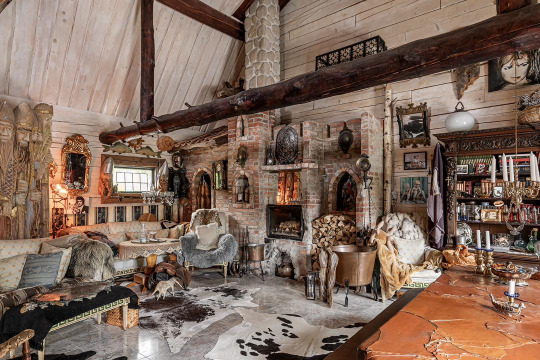
There's a lovely brick big fireplace with a stone chimney.

If I wanted to decorate like this, I wouldn't know where to begin.

For a rustic home, this is quite an elegant, very comfortable bedroom and it's in the loft. The door opens to a balcony.

These clothes look like a part of the decor and make a good case for casual, open, clothing storage.

The bathroom has a lovely sink made from an antique dressing table and a modern free-standing shower unit.


The kitchen is a glorious conglomeration of modern, vintage, and look at the island made of terracotta building blocks that handily hold wine bottles.

This is a Knight's house passage between the kitchen and the great cabin.

So, this is Amazonhuset, which is the big house.

I think that cute little cabin in the house is a coat room.

Love the corner fireplace and how the stones kind of dissipate. Cute loft above, too.
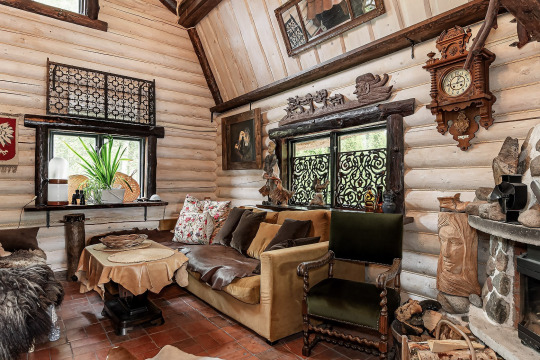
Comfortable corner living room.

This small kitchen looks commercial grade, which it probably is, b/c this property has guest cabins.

A cute bathroom with a free standing shower and look at the little corner toilet.
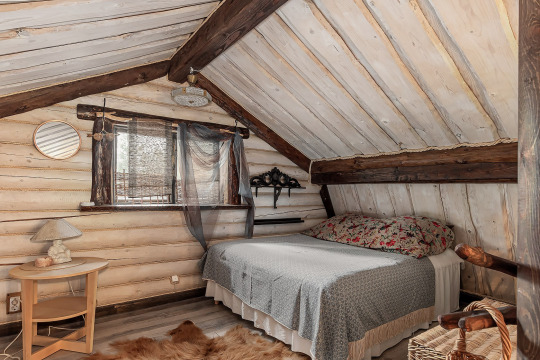
The loft bedroom.
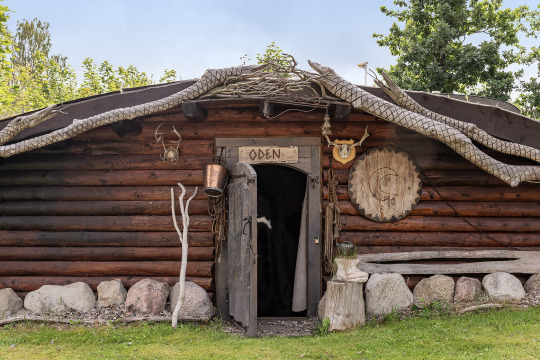
One of the guest cottages, at least I think it is.

Very interesting.


This guest cabin is cool- you sleep in the viking ship.
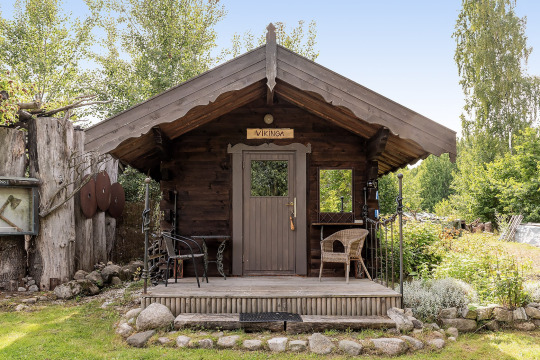
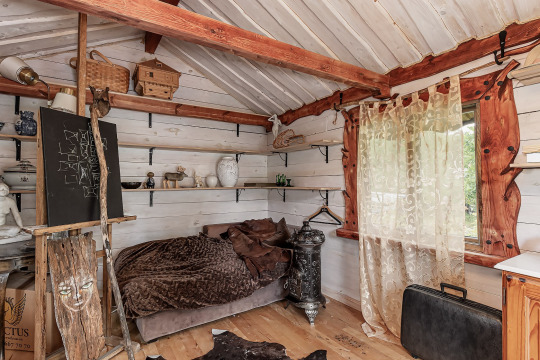
And, here's another cute guest cottage.
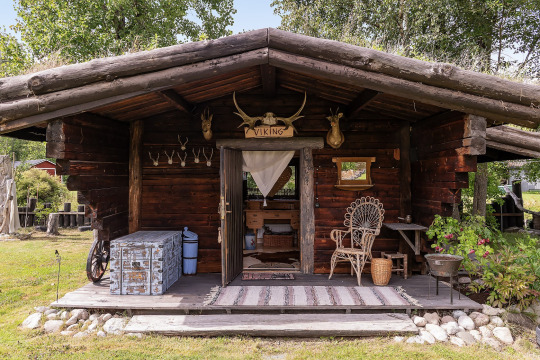

The last guest cottage is adorable. I think this would a great place for friends to share, like a compound.

There're lots of these viking carvings throughout.
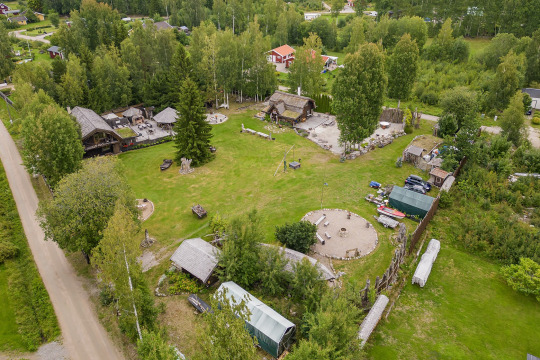
For the price, this is a very cool piece of property.
118 notes
·
View notes
Text

Out and about.
#plebschoppers#harleydavidson#rideorride#chopperlife#choppers#longfork#swedishstyle#sweden#forevertwowheels#paliwo#clublife#compound
13 notes
·
View notes
Note
Good evening beautiful! So - I had another idea that stemmed from our discussions of what it would be like spending the offseason with William in Sweden. Just imagining that you're there at the Nylander compound at the lake. It's another family get together (you already survived the giant family reunion that William brought you to just after you arrived in Stockholm) - and you're just adored by Camilla and all of William's aunts etc. At the reunion, you bonded over your mutual love of ABBA, Elton John and other bands and artists from the '70's onward. The Nylanders have a makeshift dance floor down by the water and when "On and On and On" by ABBA starts, you, Camilla, the daughters and and all the aunts lip sync and do the motions of the lyrics. William and Michael have been feeding you and Camilla drinks all night long, but they keep making them a little stronger each time (the little shits that they are).
William knows just how much to give you and knows when to cut you off - he likes it when you're tipsy enough to really show your wild side later on...
Oh, this is one of those scenarios that lives rent-free in my head! 🤭
I feel like this is one of those moments where William realises how much he actually feels for you. Let’s face it, he’s a laid-back lad in his twenties, mostly focused on hockey and his mates.
So, when a girl enters his life, it might often just be for fun, but not you. You’re here to stay - and the bond that quickly forms between you and his family simply confirms that 🤍
William’s eyes are on you all the time - maybe it’s the first time you get to spend the off-season in Sweden with his family, so he might have been a little nervous before the trip (if that man even gets nervous/worried) - but he quickly realises that there’s no need for concern 😊
His family greets you with open arms and you immediately sync with them, despite the language barrier (they’re probably used to that, so it doesn’t matter) ❤️ He can’t help but watch you and smile as you get along with his mum and his sisters - so he knows everyone’s relaxed and comfortable, and that’s when he lets you go free 😉
He watches your every move, every sway of your hips - and he notices how you gradually loosen up, getting more sensual in your behaviour 😏 Maybe you drag him to the dance floor and he gets to feel your body against him, or maybe you join him on a chair, sitting comfortably in his lap, making sure he feels your bum against his crotch…
You’re a tease and both of you know it - but William loves it! He knows your wilder side, and he’s very much looking forward to peeling those layers of clothes off you and feeling your skin against his as you both give in to your desires 🫦✨
11 notes
·
View notes
Text
*ISRAEL REALTIME* - "Connecting the World to Israel in Realtime"
▪️ISRAEL TO CAPTURE EGYPTIAN BORDER CORRIDOR.. Israel to capture Egyptian - Gaza border, known as the Philadelphia corridor (per Russian sources and Wall Street Journal).
▪️HAMAS THREATENS EGYPT.. “If Israel conquers the Philadelphia corridor, we will conquer Sinai.” Another Hamas official, “We ask Egypt to take a clear position to reject Israel’s demands to occupy the corridor.”
▪️RUSSIAN UN AMBASSADOR SAYS.. flooding Gaza tunnels could be considered genocide. (???)
▪️ISRAELI EMBASSY SWEDEN ATTACK.. thwarted.
▪️HOSTAGE ISSUE MANAGER.. ’it is absolutely clear that public demonstrations for the hostages HARDENS Hamas’s positions’ (as they know the pressure the Israeli leaders are under).
▪️HERO SOLDIER FALLS.. in battle in Gaza.
🇺🇸Regional War 🗞 2nd attack by US/UK “coalition” on the Houthis over Shabbat, “150 missiles used”. All Arab gulf states allowed US/UK aircraft to use their airspace, including Saudi Arabia, except for Oman.
Analyst: Opposite Yemen across the Red Sea and the straight is the nation of Djibouti, which has a US base with 4000 US military personnel. Possible Houthi target that they can reach.
⬇️ Southern Front 🗞 IDF blows up another tunnel complex and collapsing above neighborhood in Deir al-Balach, Gaza. As IDF captures Al Aqsa hospital, mass fleeing from the compound. Firefight catches bus on fire.
Rockets shot at Netivot from Gaza during the hillula celebration for the Baba Sali, zt”l.
Gaza battles in Sheikh Zeytun neighborhood, central Gaza.
⬆️ Northern Front 🗞 In general, more of the same: terror squads attacked, airstrikes on Hezbollah targets. Anti-tank fire from Lebanon hitting private houses in Israel.
Terror squad attempts infiltration of IDF Mt. Dov post, firefight, artillery, IDF soldier wounded, 2 terrorists killed, squad flees back to Lebanon.
➡️ Eastern Front (Judea-Samaria) 🗞 Counter-terror operations in Jenin, security forces enter Jenin hospital, forces surrounding and searching ambulances.
Qalqilya, IDF checkpoints set up throughout the city.
Tubas, firefight.
IDF OPERATIONS AGAINST TERRORIST ELEMENTS IN THE GAZA STRIP
In ongoing military operations within the Gaza Strip, the IDF persist in targeting both terrorist operatives and associated infrastructure. Notably, launch pits utilized for firing rockets at Israel have been systematically obliterated by IDF ground forces.
Maghazi Operation:
In Maghazi, IDF troops successfully identified two armed terrorists advancing towards a compound housing the troops. Swiftly responding to this threat, ground forces coordinated with an IDF aircraft, resulting in the precise elimination of the terrorists. This intervention effectively thwarted their attempt to launch an attack against the stationed troops.
Atatra Operation:
Further operations in Atatra led to the discovery and destruction of multiple launch pits employed for launching rockets into Israeli territory. The IDF's strategic efforts in this region have significantly curtailed potential threats emanating from these launch sites.
Khan Yunis Incidents:
In Khan Yunis, IDF forces encountered armed terrorists on two separate occasions. Employing precise coordination, an IDF aircraft was directed to strike and eliminate the identified threats, preventing potential harm to the forces. Additionally, IDF tanks successfully neutralized five terrorists and discovered an underground shaft within the city area.
Ongoing Operations:
The IDF's commitment to security persisted over the past day, with continued operations in Khan Yunis resulting in the elimination of nine terrorists through coordinated efforts involving the Israeli Air Force and ground forces throughout the city.
IDF COUNTERS TERRORIST INFILTRATION FROM LEBANON
Last night, IDF patrolling the Har Dov area successfully identified and engaged a terrorist cell that had crossed from Lebanon into Israeli territory. The IDF responded decisively with live fire, resulting in the neutralization of four terrorists. Concurrently, during the exchange of fire, IDF forces executed targeted artillery and mortar strikes in the area.
22 notes
·
View notes
Text
Remember how Trump often whined about NATO members allegedly not paying enough for their own defense? Under President Joe Biden, over 70% of NATO members have reached their defense spending targets – a high for this century.
NATO Secretary-General Jens Stoltenberg announced on Monday that 23 of its 32 member states were expected to meet the alliance's defense spending commitments this year. That is 13 countries more compared to last year's data, and five more than an earlier estimate in February. "This is good for Europe and good for America," Stoltenberg said in a speech unveiling the newest numbers in Washington, "especially since much of this extra money is spent here in the United States."
One of the NATO members is Iceland which technically has no military. But the stats don't include Sweden, a strong investor in defense, which just joined this year.
And as Secretary-General Jens Stoltenberg reminded us above, a lot of that European defense spending benefits US industries.
Speaking to DW, Davis Ellison, a strategic analyst from the Hague Center for Strategic Studies, said that the collective recognition of NATO targets is especially noticeable when examining how much defense spending is now dedicated to new equipment. "In the past, you had a lot of focus on personnel costs, which ranges everything from pension to health care and everything else," Ellison explained. "But now you have a much greater collective investment in equipment, which is more to meet NATO targets than anything else." The security expert pointed out that this extra spending compounded NATO's military might.
Putin's invasion of Ukraine was a wake-up call for liberal democracies. It's significant that four of the top six NATO countries for defense spending share a land border with Russia.

Trump's claim that our allies respected America more during his administration is a bizarre joke. In fact, they actually made fun of him behind his back. Remember this classic SNL sketch about a NATO summit in 2019?
youtube
The only international leaders who liked Trump were dictators who found him easy to manipulate.
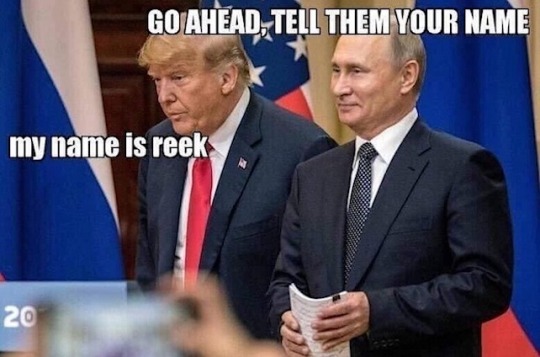
Former Prime Minister Malcolm Turnbull of Australia called Trump "creepy".
Malcolm Turnbull says Donald Trump's 'creepy' embrace of Vladimir Putin a threat to Australian security
NATO and other liberal democracies have become stronger since Trump's departure.
#nato#otan#defense spending#jens stoltenberg#trump is weak on defense#donald trump#trump is mocked by world leaders#snl#trump weakens america#trump is putin's bitch#axis of dictators#vladimir putin#russia#invasion of ukraine#russian aggression#russian imperialism#poland#polska#usa#estonia#eesti#latvia#latvija#lithuania#lietuva#владимир путин#путин – убийца#путлер#трамп - путинский пудель#путина в гаагу!
8 notes
·
View notes